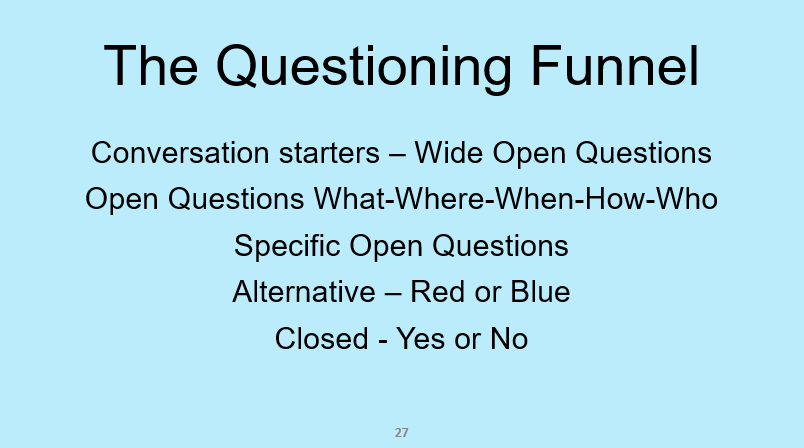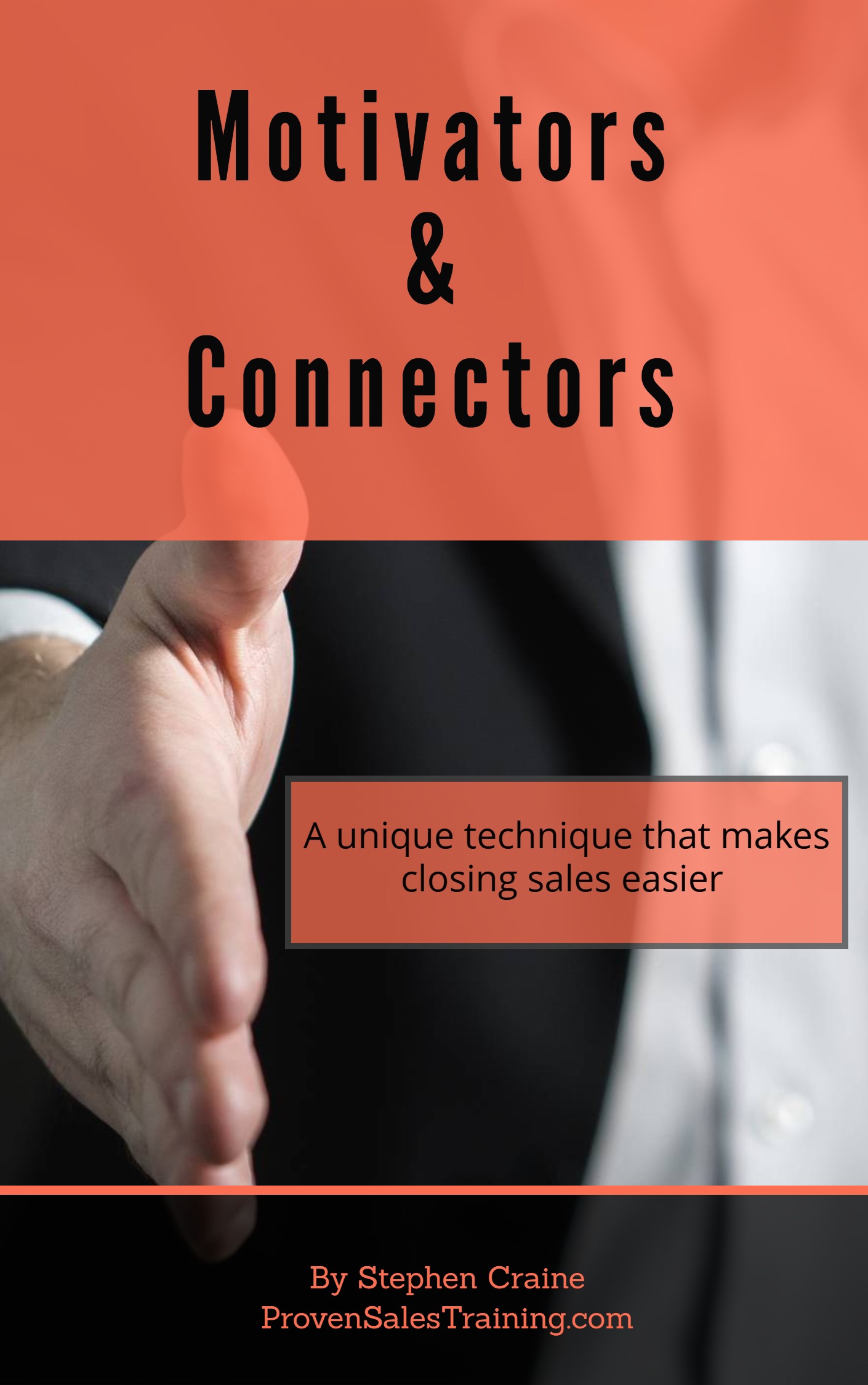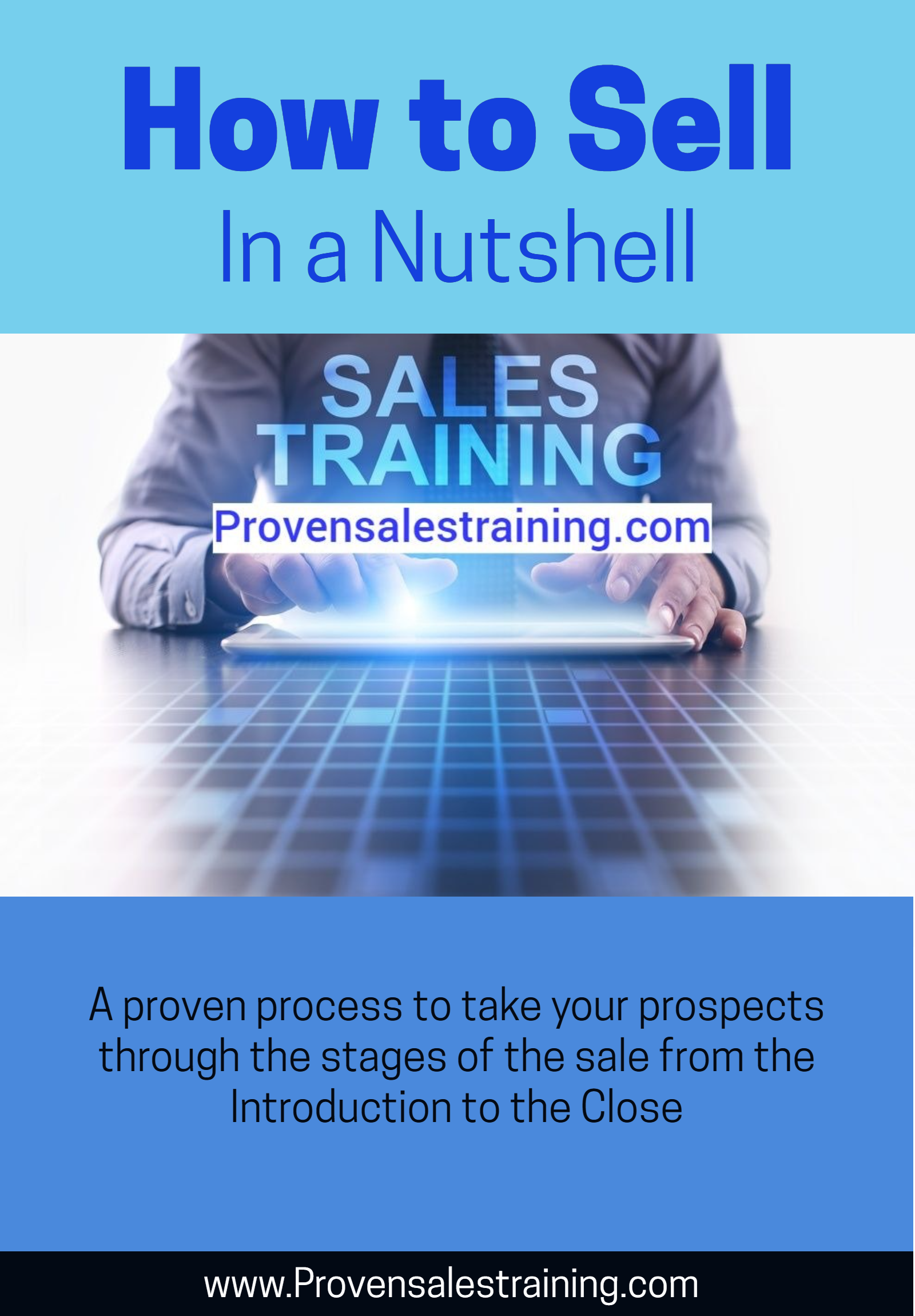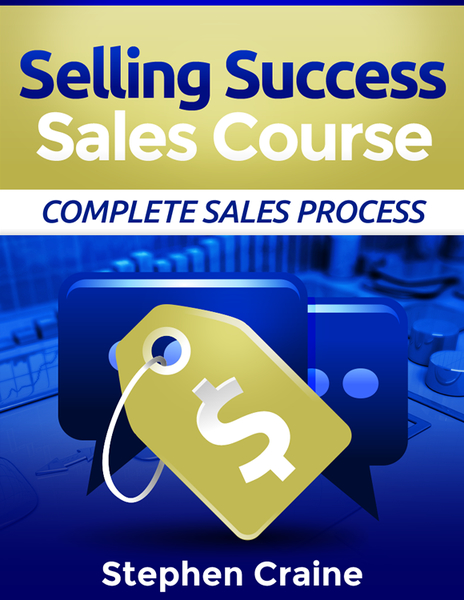Professional Sales Training advice
Maximise Your Sales Results and Income
Learn how to make sales training work
for you or your team
Professional sales training advice for individuals and team managers on how to make sales training work to improve sales skills and maximise results and income.
Why most sales training doesn't produce results
Companies pay huge amounts of money and invest their resources on sales training. Sales people by books, online sales training courses, and training events.
When the teams and individuals finish the training they go back to their sales role and... Nothing!
None of the promised boom in closed sales, no diaries bursting with sales appointments, and no return on investment for the individual or the businesses.
Why?.. Here are 2 reasons why sales training fails
- Training must be customised to address the weakest areas of the individuals sales skills.
- Sales people must be coached and helpd to put the skills and techniques into action.
My professional sales training advice
I've been managing and training sales people for over 25 years and witnessed sales teams all given the same training even though their needs as individuals were different. If a sales person is great at the Introduction Stage of a sale and the questioning to qualify prospects but has difficulty closing sales, the training should be focused on how to close sales.
I've seen corporate sales training, delivered at great costs, and sales people couldn't or wouldn't put it into action. Making changes is difficult, uncomfortable. You can't expect people to listen to a presenter or read a book once and put new sales techniques into action.
Let's assess the training needs of you or your team members as an example...
Professional Sales Training
How to assess training needs
To make it easy to assess professional sales training we break the sales process into stages.
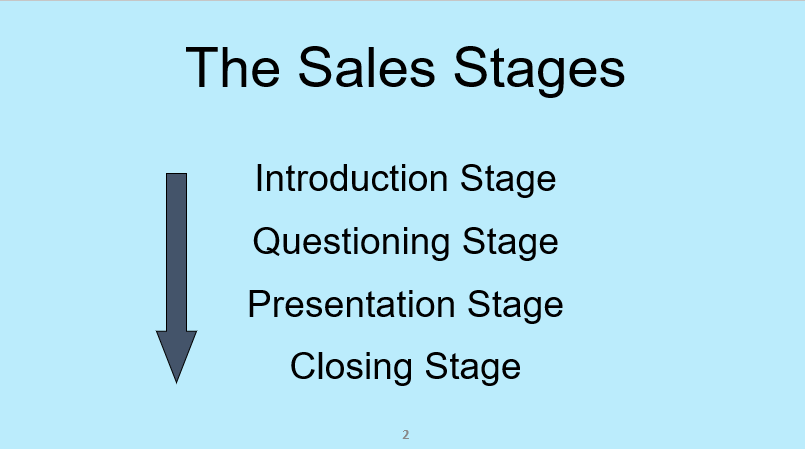
There are the prospecting stages, pre-sales stages such as making sales appointments, and then the sales process as shown on the image.
If you don't have enough planned sales meetings or calls then it's obvious the most benenficial training for you will be focused on prospecting or making sales appointments.
There is no point looking for professional sales training on closing sales if you don't have prospects to sell to.
It's the same with the other stages of the sale. You look for indicators of where improvements are needed and will give you the most benefit.
What about the stages of the sales process, how do you asses your training needs for them?
Where to focus your sales skills training
How do you get your prospects for visits or calls?
If you source your own prospects and need more, look for training on prospecting or consider outsourcing this specialist task to experts to provide you with leads. There are many great companies and a good tip on finding one you can rely on is to see if they offer to calculate your return on investment. You want to know the number of conversions and the sales revenue you can expect from the leads you are purchasing.
Do you make your own sales appointments?
This is an easy stage to assess whether you need professional sales training to improve your results.
If you don't have enough sales appointments planned, or you are only converting small numbers of calls to meetings with prospects, you have a need for effective appointment calling. Sales training on this stage of the process will give you more sales opportunities, maximise your selling time, and save you money on wasted leads that you currently don't convert.
Here is great place to start your search for the best sales appoinment training to suit your needs. The mini-course on Making Sales Appointments is an intrdoction to making cold calls for appointments, responding to incoming enquiries, and following up on information sent.
Follow the link or click the image to learn more.
Do you get stopped in the Introduction Stage?
When you meet or call prospects do you get stopped as you introduce yourself, the company or product, and give your reason for the conversatio? This is a sign of needing professional sales training on creating a stunning sales introduction.
Indicators of problems with your introduction stage are:
- Being stopped by early sales objections.
- The introduction going on too long, conversations getting side tracked.
- Not having a clear agenda for the sales conversation with the prospect.
- No definite reason for the meeting or call with potential prospect benefits.
- Stumbling and fumbling, not knowing what to include in the introduction.
If your sales conversations get off to a bad start, if you recognise any of the above indicators, take a look at the free sales training on creating a Stunning Sales Introduction
Follow the link or click the image to get the free sales training on the Introduction Stage of the sales process.
Do you have a plan for asking Sales Qustions?
You need a plan for asking sales questions to discover the needs, wants, and desires of a prospect.
Without a plan, such as the Questioning Funnel shown, prospects can feel interrogated with a barage of yes or no questions, this leads to frustration, unuseable answers, and excuses to end the meeting or call.
Sound familiar?
Get professional sales training on the Questioning Stage.
Sales Presentations - Do you get objections?
As you present your proposal, solution, and the services or products that will fulfil the prospect's desires, do you get questions and new information?
This stage should be a smooth presentation. If your presentations turn into a new sales conversation where you lose the flow towards the Closing Stage, you need sales training to improve it.
Get the Presentation Stage working effectively and the close becomes a simple question. See how to do this by visiting Sales Presentation Training
What's your conversion rate closing the sale
Getting to the closing stage, where you ask for the sale, is an achievement. You have introduced yourself without being stopped by objections, and the prospect has travelled with you to the Questioning Stage. You have asked questions and been able to form a Sales Presentation using the information you gathered.
Now comes the Closing Stage...
Do you measure your conversion rate of closed sales to meetings or calls?
You should...
Divide the number of meetings or calls by the number of closed sales. Compare to colleagues, measure it now, then again after some professional sales training and see the improvement.
If you are getting to the close on a good number of your calls or sales appointments, training on how to close sales will make a big difference to your results and your income. Start your sales training at: How to Close Sales
Professional Sales Training on the Sales Process
Connecting the stages of the sale
I've trained sales people who have mastered all the stages of the sales process, but they got objections or the sales stalled as they moved from one stage to the next.
In the training I present there are sales techniques to connect the stages of the sale using Motivators and Connectors.
By adding these sales techniques to your sales process you turn a collection of sales stages into a complete, flowing process that starts with an introduction, goes through questioning and the presentation, and on to the cloising of the sale.
When you have introduced yourself and your business or products, do you struggle to get the prospect moving to the questioning stage?
After asking the questions do you easily move into the sales presentation, or does the conversation go off track?
From the presentation to the close should be seamless. If it isn't, you need professional training on connecting sales stages and motivating prospects to move forward. See this free mini-course on doing exactly that by visiting: Motivators & Connectors
See the free training by following the link or click the image.
Understand and use the sales process
When you understand the sales process and how to use it you can quickly assess your strengths and weaknesses and where to get the best return from your investment in sales training.
This mini-course is an introduction to underdstanding and using a sales process.
You will see how the process fits together, how each stage follows on from the previous one.
You'll learn the logical progression that sarts with an introduction and concludes with you gaining agreement to a sale or whatever next action is your sales close.
Understanding the sales process means you can improve your sales results, and assess the next training actions.
Once you gain this knowledge, you can also help other people asses their training needs and improve their sales skills. And that is a valuable attribute to gain that can lead to greater earnings and career progression.
Click the image for more information on the mini-course How to Sell Anything
Professional Sales Training Advice
At the start of this page I said there were 2 reasons why sales training fails. One we have covered on this page with how to assess where the training you will benefit from most should be focused.
The 2nd reason was the lack of follow up, training with no coaching or monitoring of results and assessing new action plans.
There are ways to combat this.
If you have a colleague that wants to improve their results and earnings, pair up with them and coach each other. Assess progress and monitor results.
If you're a sales manager you are the coach. Present the training you find on the website, use the free eBooks, information on pages, and the professional sales training courses.
If you're investing in yourself, assess your training needs, come back to the training on the website and in the courses you have downloaded. Actions - Monitor Results - Assess - Act.
When you focus on improving a particular sales stage look for all the different training available and use it. Look in the Free Sales Training section of this website and in The Shop.
In The Shop you can see my 2 complete courses on Making Sales Appointments by Telephone and Selling Success.
The Selling Success course is the course I have used to train corporate sales teams for many different organisatons in different industry sectors.
The course will give you everything you need to know to put this proven sales process into action and achieve your personal and career goals.
Click the image to see more on the Selling Success Course or visit The Shop to see all the professional courses.
Keep improving your weakest part of the sales process and you will experience rapid growth and progress.
- Homepage
- Sales Made Easy
- Professional Sales Training Advice


